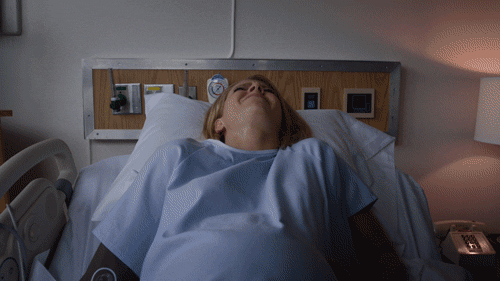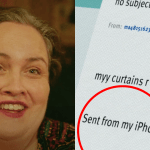
Ah, endometriosis. The heat death equivalent of period pain. No, really, it’s one of the most debilitating conditions around, and if you’re unfortunate enough to have it, it can seriously affect your life.
Because periods weren’t tricky enough, amirite?! Endo is what happens when your endometrial lining (the gloop that lines your uterus come baby-prepping time) starts growing outside of your uterus, on your organs. And it’s bloody painful.
I asked one of my best friends about her experience with endometriosis and this was how she described it:
“The best way I can describe mild-to-bad period pain is as if you had two hands, covered in fiery gloves, rhythmically kneading on your pelvic organs as if they were bread. The best way I can describe really bad endometriosis period pain is as if the fiery gloves also had spikes and claws.”

I’m wincing.
The problem is that even with huge stars like Halsey and Daisy Ridley coming forward about their experiences, there’s still a lot of people who just pass it off as ‘bad period pain’ — and I would encourage those people to consider what it would feel like if they suddenly lowered themselves onto a cactus, because really, same same.
We’ve teamed up once more with Libra and Ask Gemmah to give you the real deal about endometriosis — yep, all the bloody details themselves.

this, but in your cavities.
1. How do I tell the difference between ‘normal’ period pain, and something which should be investigated as endometriosis?
We all have an individual personal threshold of pain, which tells us when something isn’t quite right. Any pain that affects your daily life, your ability to perform daily tasks and interact with the world, should not be considered as normal. That being said, endometriosis is also a question of location, frequency and duration.
Another thing to note is that if your periods are super heavy, it could be a symptom of endo. Don’t get me wrong — some people just have a heavy flow, and to those people I say whack on a super-sized pad and go about your day. But if yours is untenable? Trust your body and your instinct, and go see a doctor.
So ultimately, you shouldn’t rely on a standardised barometer of pain to figure out what’s ‘normal’ and what’s symptomatic of endometriosis. If you’re not feeling right and you’re worried, go to a doctor who’s willing to look beyond a diagnosis of ‘bad period pain’.

so trust it if you feel like something is wrong.
2. Are there things that you can do to stop the pain during and after sex? It feels like 100s of needles are hitting my stomach almost every time I have penetrative sex.
Okay, let’s talk experimentation when you woohoo. If penetrative sex is painful for you, it may be because your endometriosis is deep within your pelvis. You can experiment with different brands and types of lubricant (some may hurt while others don’t), as well as different positions.
Pain during and after sex may be due to different things, so determining what exactly is causing the pain may be the best way to look for a solution. Pelvic pain specialists tend to focus on different methods for managing these symptoms, ranging from specific creams, pelvic physio, hormonal treatments and even nerve blocks. It may also be different at varying times of the month (your cycle could affect it) so just give it a red hot crack at different times to see what’s doable.
Above all, never feel pressured to do anything that causes you pain, or feel guilted if you change your mind halfway through. Your body changes — sometimes popping a peen in the vagine may cause no pain, while the next week you may find it practically impossible to have any type of penetrative sex. There is nothing wrong with you if your capabilities change and fluctuate.

don’t make me tell you again.
3. Can endometriosis come back after surgery?
Surgeries like laparoscopic excisions and hysterectomies can be used to treat endometriosis, removing the endometrial lining from the affected organs (or in the case of a hysterectomy, removing the uterus entirely). It’s meant to help rid you of endo, or at the very least reduce it.
But can it return? The simple answer is: yes, but not necessarily. There’s no guarantee for how long you will be ‘endometriosis-free’ after surgery, and while hysterectomies will remove the uterus, if you have endometrial tissue elsewhere you may still have pain. Some patients never experience any symptoms again after surgery, while others will find relief for only a few months.
The success of surgery is very case-specific. However, keep in mind that you can still have a significant improvement in quality of life, even if the disease isn’t entirely ‘cured’ or if you are not entirely ‘free’ of endometriosis. You should always discuss the expected outcomes/prognosis of your surgery with your gynaecologist who knows the specifics of your case.

no thank you, piss off.
4. What happens if endometriosis is left untreated?
Believe it or not, it can take years to be diagnosed properly with endometriosis. So that means years of not treating it as best as you physically can — and what’s that doing to your bod, really? The answer is simple, but annoying: it depends.
Early diagnosis can assist with pain relief and improving quality of life, but ultimately when it comes down to it, endometriosis treatment is mostly about managing symptoms. This may be as simple as using a contraceptive pill to reduce the amount of periods you have each year or inducing menopause to halt them entirely, but it’s not a one-size-fits-all situation.
What would happen to your body varies on a case-by-case basis. As endometriosis is a chronic inflammatory condition, the complications that could arise vary from chronic pelvic pain and infertility through the adhesions and ovarian cysts. Some people are fortunate enough not to have increased pain with their endometriosis, and only find out that they’ve got it when they start undergoing tests to find out why they aren’t getting pregnant.

well, shit.
5. Can endometriosis make it harder to have children?
The truth of the matter is that endometriosis CAN have a negative effect on fertility levels for people who want to have kids BUT there have been countless people who’ve managed to fall pregnant without the assistance of technology.
How much your endometriosis can affect your fertility depends entirely on your specific case, and how far it’s progressed by the time you want to get pregs. As mentioned above, some people only find out they even have endo when they struggle to conceive and can’t figure out what in the fresh hell is happening up there in the baby maker.
Then there are some people who seek out pregnancy as a ‘cure’ for the painful symptoms, but the issue is that pregnancy can only reduce for a duration at best. It cannot eliminate endometriosis from your system, so if you decide to birth a sprog, make sure you’re doing so because you actually want to.

applicable to both endo and sprog.
All in all, we should absolutely be taking endometriosis more seriously because folks, this disease is a real bitch to deal with. Period pain can be difficult enough without taking it into an overdrive that makes those fancy F1 cars look like little piddly toy cars.
If you or someone you know is dealing with endo, you have our sympathy 1000%.
Next up we’ll be answering questions about hormonal changes. We’re talking cravings and sleep disruption — and no, we don’t just mean when your girlfriend or sister gets cranky around that time of the month. Send your questions through below and we’ll give ’em a red hot crack.
Disclaimer: the questions will not be answered by a physician, but one has been consulted for accuracy. If your period questions were not answered in our first few rounds with the DM Doctor, head over to Ask Gemmah.



